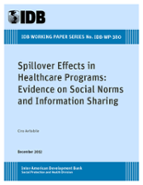Spillover Effects in Healthcare Programs: Evidence on Social Norms and Information Sharing
Date
Dec 2012
Although cervical cancer is considered one of the most preventable types of cancer, mortality rates in many developing countries are extremely high. This paper exploits the randomized research design of a large welfare program "PROGRESA" to study the existence of spillover effects in cervical cancer screening in rural Mexico. I find significant evidence of increased demand for Papanicolaou cervical cancer screening among women ineligible for the transfer, yet no evidence of similar externalities in non-gender specific tests, such as blood pressure and blood sugar checks. Different pieces of evidence from the evaluation sample and the nationwide rollout are consistent with the hypothesis that the PROGRESA program has weakened the social norm related to husbands' opposition to screening of their wives by male doctors. I find less evidence to support the hypothesis that the spillover effect is driven by higher levels of health information.



